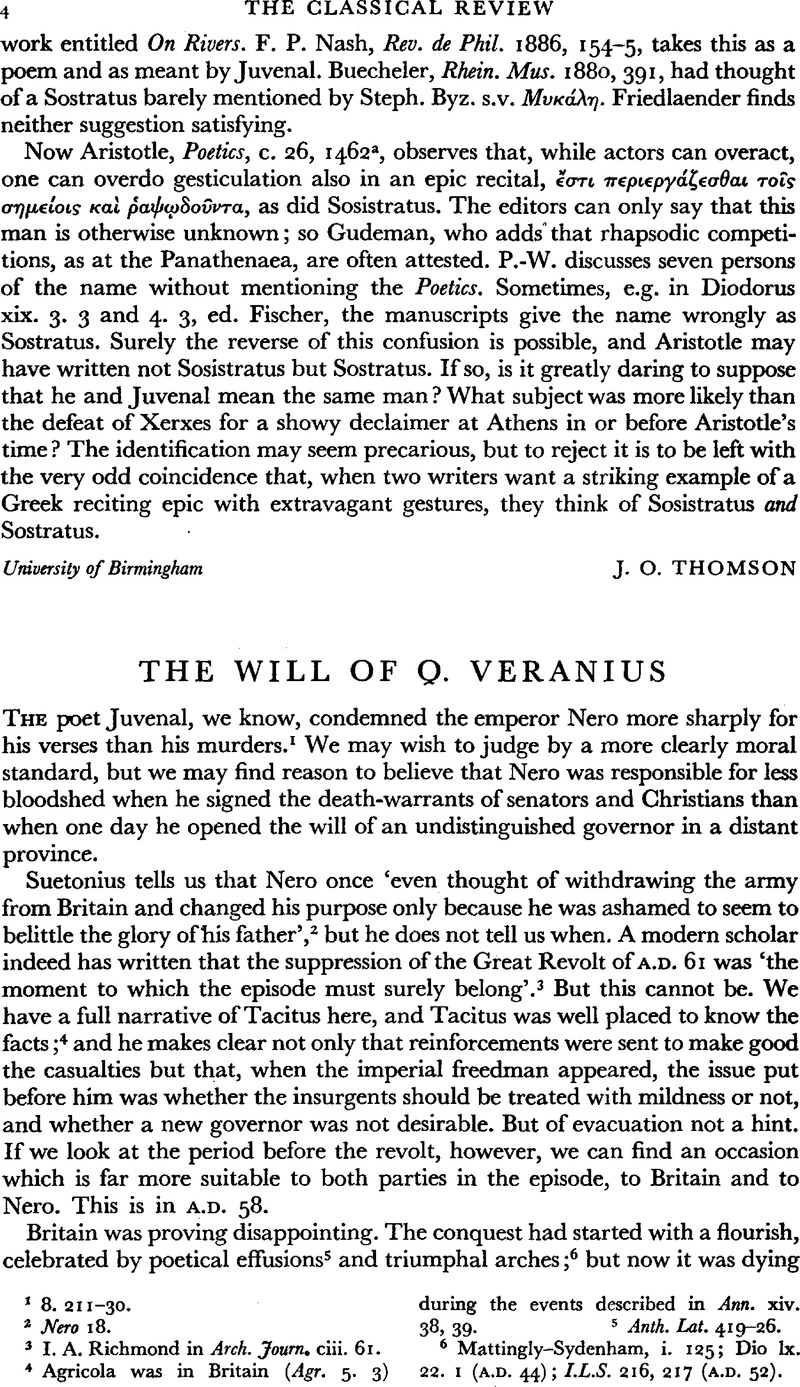Published online by Cambridge University Press: 13 February 2009

page 4 note 1 8. 211–30.
page 4 note 2 Nero 18.
page 4 note 3 I. A. Richmond in Arch. Journ, ciii. 61.
page 4 note 4 Agricola was in Britain (Agr. 5. 3)during the events described in Ann. xiv.38, 39.
page 4 note 5 Anth. Lat. 419–26.
page 4 note 6 Mattingly-Sydenham, i. 125; Dio Ix 22. 1 (A.D. 44); I.L.S. 216, 217 (A.D. 52).
page 5 note 1 I.L.S. 970 with Oliver's revised readings (A.J.P. Ixix. 219).
page 5 note 2 Cf. Antiquity, xxi. 5.
page 5 note 3 The Orkneys (‘Orcades’) supposed have submitted to Claudius (Eutropius vii. 13. 3; Orosius vii. 6. 10; Jerome, Chron., ed. Fotheringham, 261; Cassiodorus, Chron. Min. ii. 137). The matter, too long for footnote, is discussed in the following article.
page 5 note 4 C.I.L. vii. 1201, 1202. On the meaning of EX ARG on C.I.L. vii. 1203, also from the Mendips, Smythe in Trans. Newcomen Soc. xx. 139.
page 5 note 5 The ‘Degeangli’ of Flintshire (cf. J.R.S. xii. 283), attacked by Ostorius (Tac. Ann. xii. 32). On other mines, Economic Survey of Ancient Rome, iii. 42–5.
page 5 note 6 The mines at Dolaucothy, Carmarthen-shire, ib. iii. 39.
page 5 note 7 Strabo ii. 5. 8, p. 116; iv. 5. 3, pp. 200, 201. The point was made subsequently, of course, by Appian, BC, praef. 5.
page 5 note 8 Apocolocyntosis 8.
page 5 note 9 Nero did eventually withdraw a legion from Britain for an Eastern project (Tac Hist. i. 6).
page 5 note 10 Tac. Ann. xiii. 50.
page 5 note 11 C.I.L. vii. 11; Tac. Agr. 14. 2. If a legatus, Cogidumnus ought (in spite of Anderson in ed., p. 80) to have been adlectus in senatum. I.L.S. 1072 (if the order of the cursus on the stone is the true order of the career) of c. A.D. 150 seems the only example of a legatus who is not a senator, and it is not really a parallel. Surely only Claudius could have done some thing so eccentric.
page 5 note 12 C.I.L. vii. 12 = E.E. iii, p. 114 = ib. ix, p. 513. C.I.L. vii. 11 could well be contemporary, for the domus divina formula can be as old as Tiberius (Anderson, I.c.). And Romans at the court of Cogidumnus would be especially nervous!
page 5 note 13 Excavations at Ridgehanger, Hampshire, shire, reported in Proc. Hants Field Club (forthcoming).
page 5 note 14 Dio lxii.2. 1. Was that why the procurator too demanded back the money that Claudius had given to Britons (? including Cogidumnus) ?
page 6 note 1 Tac. Ann. xiv. 29. We must not forget that Veranius had a certain military reputation; Onesander dedicated his tactical treatise to him (praef. I).
page 6 note 2 Suetonius, I.c.
page 6 note 3 Pliny, N.H. v. 14; Dio lx. 9. 1.
page 6 note 4 Mommsen, Staatsrecht, ii. 594.
page 6 note 5 ‘Mon mam Kambre’, Giraldus Cam-brensis, Itin. Kambriae, ii. 7; Descriptio Cam-briae, ii. 6 and Bede, H.E. ii. 9 (frugum proventu atque ubertate).
page 6 note 6 Sir Cyril Fox, Llyn Cerrig Bach, esp. pp. 59–74.
page 6 note 7 Tac. Ann. xiv. 31. ara, the reading of the first hand of the Mediceus, is perhaps prefer-able as the lectio difficlior.
page 6 note 8 Ib. 30, excisi luci saevis superstitionibus sacri.
page 6 note 9 N.H. ii. 187.